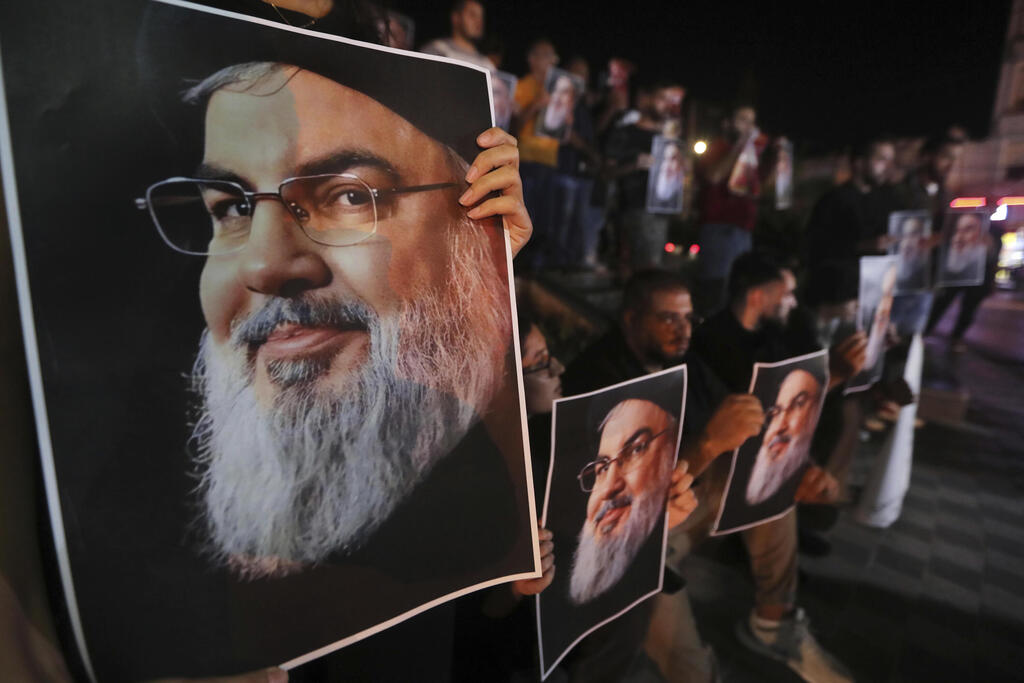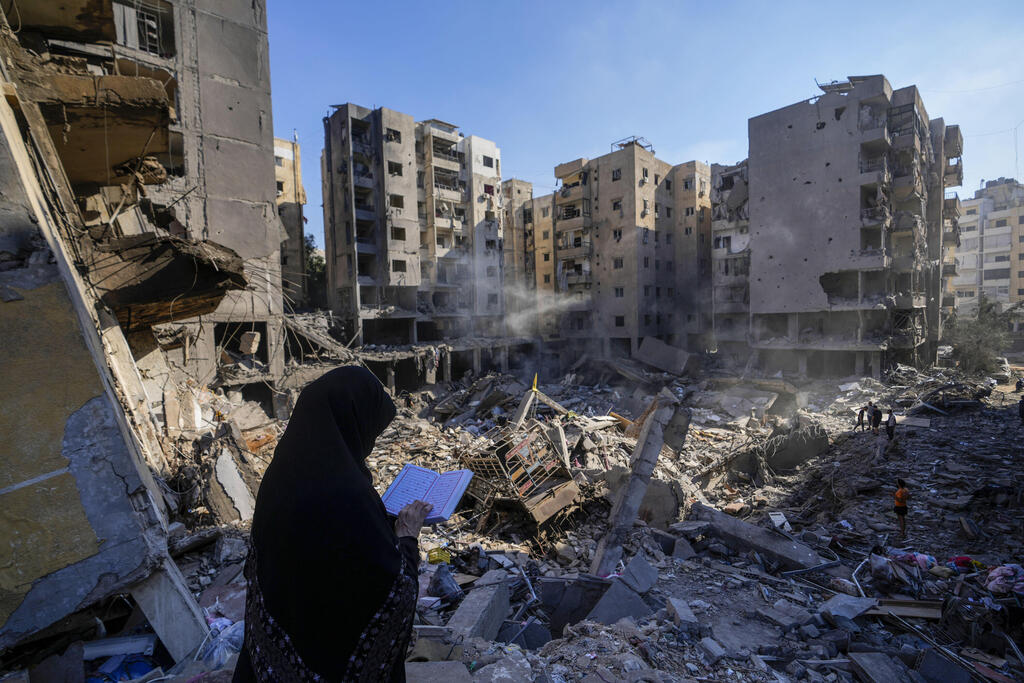Getting your Trinity Audio player ready...
Nasrallah's son at the site of his father's assassination
Hezbollah, far more than a mere military entity in Lebanon, is woven into the nation's fabric as a "legitimate resistance group" rather than being labeled a terrorist organization. With branches that extend into the social, economic, cultural, and political spheres, Hezbollah's representatives have been integral to Lebanon's political leadership, overseen in recent years by the organization's secretary-general, Hassan Nasrallah, who was eliminated last Friday. In the wake of his death, Lebanon—a country already beset by crises—stands on the precipice of significant political, security, and military shifts.
Amid the chaos, various factions in Lebanon underscore the critical need for unity. The exact number of displaced persons remains elusive, with estimates suggesting it could reach a million, while the full extent of ongoing attack damages is yet to be assessed. On Sunday, the Lebanese newspaper "An-Nahar," unaffiliated with Hezbollah's stance, published an article titled "This is a Time for Unity, and Unity Only." It highlighted that Lebanon has never faced such a threat to its state integrity, with a presidential vacuum and institutional paralysis compounded by the danger of Israeli attacks.
For decades, Hezbollah recognized no leader other than Nasrallah, a figure instrumental in reshaping the political landscape in Lebanon and beyond. His assassination raises profound questions about the organization's future within Lebanon and its confrontation with Israel. Some political elements in Lebanon, who initially opposed entering the fray against Israel "in support of Gaza," have recently voiced clear opposition to Hezbollah.
Lebanese and Arab commentators have sought to predict Lebanon's political future. Lebanese researcher Mohammad Ali Moukalad, interviewed by BBC Arabic, suggested the assassination might present Hezbollah with an opportunity to adopt a "more moderate stance" and pursue arrangements to restore Lebanon's full sovereignty. According to Moukalad, Nasrallah's removal could pave the way for a political solution in Lebanon, including presidential elections. He posited that Nasrallah's absence from the political arena might divide Hezbollah into a "small extremist faction," with the majority potentially realigning with the Lebanese state and distancing from the Iranian agenda.
5 View gallery


Residents of Beirut clean up the destruction caused in an Israeli attack on the city
(Photo: Louisa Gouliamaki / Reuters )
The organization's future also hinges on another pressing question: who will succeed Nasrallah? It is uncertain whether the potential successors, notably Hashem Safieddine, head of Hezbollah's executive council, can wield the same influence as the slain secretary-general, renowned for his "exceptional personality capable of unifying ranks." While Saudi media outlet Al-Hadath reported Safieddine's selection by Hezbollah's Shura Council, this has not been confirmed by Hezbollah-affiliated channels, and the organization has subsequently dismissed these reports as baseless until an official statement is released.
Iraqi researcher Suhad Talabani penned an article asserting Nasrallah's assassination could plunge the organization into internal chaos. No entity led by a singular leader for such an extended period, with such unique attributes, can easily find a replacement. She argued that additional assassinations by Israel exacerbate the chaos within the organization, at least temporarily. Talabani also emphasized that Nasrallah's death would profoundly impact Lebanon's political landscape, as Hezbollah wields more political than military influence.
Nasrallah was a charismatic figure whose influence shaped domestic Lebanese decisions and the sectarian and political balances between various forces. A vacuum now looms, not only within Hezbollah but across Lebanese politics. This void could heighten tensions and spark conflicts among factions vying for increased influence. Talabani also speculated on the possible fragmentation of Hezbollah's central leadership structure, potentially leading to sub-groups with differing loyalties, which might weaken the organization as a unified force. Alternatively, regional powers supporting Hezbollah, like Iran, may now intervene more aggressively to reconstruct the leadership. Whether this effort will succeed remains to be seen.
5 View gallery


Lebanese watch Nasrallah's televised address days before his assassination
(Photo: Mohamed Azakirv/ Reuters)
Nasrallah's assassination will undoubtedly impact Lebanon both militarily and politically, though the scale and direction remain uncertain. These areas were already opaque in Lebanon even before his demise. The central question is whether the organization can overcome the internal chaos, maintain its cohesion, and remain a dominant player in the Lebanese domestic arena and the Shiite-Iranian axis, or if we are witnessing the dawn of significant changes in Lebanon and the region.
Hezbollah is attempting to project a facade of "business as usual," albeit unsuccessfully. It can be said that the meticulously organized terror group has been thrown off balance. From the onset of the Gaza war, Hezbollah's claims of responsibility were systematically published, even numbered. For each target attacked in Israel, the group included a map indicating the location, should Israel need clarity on its intended targets.
Throughout the war, one could observe the terror group's learning curve in responsibly publishing information. They drew lessons, made the information more accessible to the public, and recently altered the design of their announcements once again.
5 View gallery


Wounded rushed to hospitals after coordinated detonation of Hezbollah communication devices
(Photo: Anwar Amro / AFP)
Following the recent explosions of pagers and communication devices and assassinations in Lebanon, the situation has shifted. While the group continues to issue claims of responsibility for firing into Israeli territory, they are almost exclusively limited to these claims. In the past two days, Hezbollah announced the assassination of the organization's secretary-general Hassan Nasrallah, the commander of the southern front Ali Karaki, and Nabil Qaouk, who headed Hezbollah's preventive measure unit, but in an atypical manner—without pictures, scant details compared to previous reports, and without funeral dates.
During the past year, Hezbollah routinely published the names and photos of its operatives killed at all ranks. In recent days, this practice has ceased entirely, despite a significant number of casualties within the terror group's ranks.
It appears Hezbollah is striving to convey normalcy, albeit unconvincingly. Is this due to the absence or incapacitation of those responsible for their media operations? Or might it be a precautionary measure following the breaches into the organization demonstrated by Israel in recent weeks? Regardless, it seems other issues currently preoccupy them, and the order has been disrupted. The one consistently publishing throughout the war is Hezbollah's mouthpiece, Ali Shuaib, a correspondent for the Al-Manar channel affiliated with the terror group, who appears unfazed by recent events.








